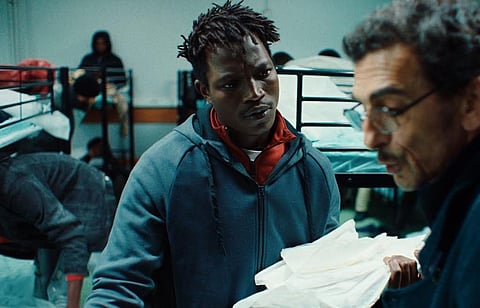

If cinema is all about shining a light on the many contradictions facing the world, then Boris Lojkine’s Un Certain Regard jury and performance award winner The Story of Souleymane brings us face to face with contemporary global strife—of enforced human exodus and exigencies of seeking asylum in an alien land.
As the title itself spells out, Lojkine focuses on the universal phenomenon through the individual experience of its lead, Souleymane Sangare (Abou Sangare). The film follows him through two days in Paris, leading up to his asylum interview with the authorities. It begins with Souleymane being led in for the official examination and then takes us back to the recent events leading up to it. Originally belonging to Guinea Conakry in West Africa, Souleymane has had to relocate out of sheer destitution and the economic necessity to earn not just for himself but also to help build a comfortable life for his ailing mother back home. It’s much later in the film that it gets revealed to us how dangerous the passage to France has been for him, with torture and abuse on the way through Mali, Algeria, and Libya.
Lojkine’s narrative is pacy and moves like an edge-of-the-seat thriller. However, it switches effortlessly between the fiction and documentary aesthetic, largely following the verite style of filmmaking, documenting the minutest of gloomy details of a poor immigrant’s life as he goes about cycling through the city, working illegally as a courier boy, delivering parcels and food. Amid the trudge, he has a run-in with the cops, gets into an accident, is yelled at by a customer, picks up a fight with a friend who is refusing to pay him his dues and tries hard to secure the necessary papers for his interview from an immigration agent. On top of it all, he must also struggle to find a night shelter to sleep in, in the cold nights and has a heart-aching breakup over the phone with his sweetheart back at home coaxing her to marry the engineer who has proposed to her. He can’t promise her a good life like him, at least not in the immediate future. So why keep things on hold for her? It is the most beautiful moment in the film, shattering in its boundless sadness even as it reveals Souleyman’s depth of selflessness and sensitivity.
The handheld camera follows him closely all the way as he runs against time. It is a tough and rough ride into the heart of darkness that Lojkine takes us on with him. He also keeps us invested in the fate of his protagonist. A heartfelt, spontaneous and unadorned performance by the non-professional actor Abou Sangare, who is a mechanic in real life, helps fuel and build up the audience’s empathy for his character. There is something simultaneously intense and vulnerable about his presence. Most heart-tugging is to encounter Souleymane trying to memorize a false narrative, spun for him by an agent, that’d ostensibly help expedite the legalization of his immigration. It’s as though he is preparing for a school or college exam. But without any conviction on his own part to do well and clear it. How can he seek refuge as a political asylum-seeker when he is intrinsically not “political” and knows nothing about politics Why can’t the truth about his life help him sail through?
Beyond Souleymane’s personal predicaments, Lojkine also documents the entire industry that gets built around immigration and asylum. It’s a business that involves profiting from the despair and desperation of people, with greedy agents assuring passage to safety and security at a high price. But do they deliver on their promise? On the other hand, are the supposedly hostile authorities, insensitive to the plight of the nameless, faceless, invisible and undocumented souls that haunt their cities? However, Lokjine doesn’t demonize the officer, caught as she is between her sympathy for Souleymane and adherence to the rules and regulations.
The film doesn’t offer closure. Will Souleymane be given the right to live and work in France? We don’t quite know. What we do gather is the implicit appeal to immigrants at large to not allow others to write stories for them but to take control of their own narratives. Hopefully, there will be many to lend them an ear.